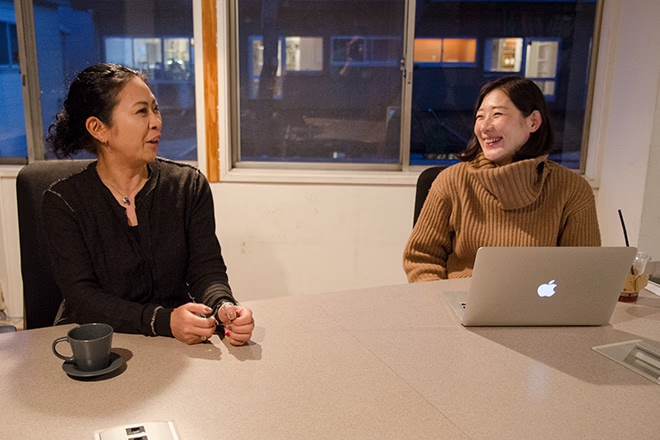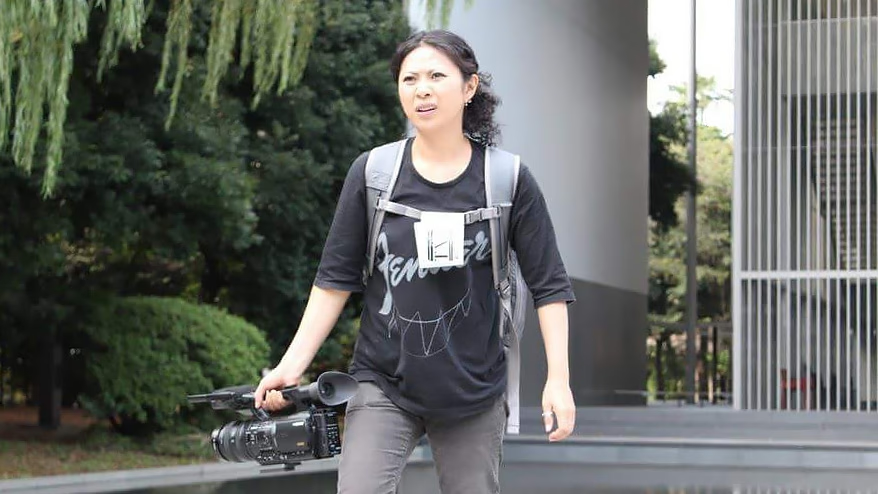ビデオディレクター及川夕歌さんのお話を前後編でお届けしている今回のめぐるモノサシ。前編では、岩手での子供時代の思い出からNHKのディレクターとなってからのエピソードなど、及川さんの土台となっているとも言える日々についてうかがいました。
続く後編では、フリーランスとして活躍する及川さんの映像作りに対する考え、今後の展望について一緒にお仕事をし、たくさんのことを学ばせてもらっている畠中友香がお話をお聞きしました。
(インタビュー構成:佐口賢作)
-

-
及川夕歌さんプロフィール:
ビデオディレクター
学生時代、アルバイトで(うっかり)映像業界の制作補助に携わる。94年から、NHK−BS2にてディレクターとして本格的にテレビ番組制作に参入。構成・演出・撮影・編集のノウハウをみっちり仕込まれる。09年からはフリーランスとして活動。企業VPからコンテンポラリーダンスの映像制作、MVにいたるまでカテゴリーを問わず「映像で残す」仕事に携わっている。
「早く」でも、「深く」向き合う
アナログからデジタルへの変化の中で培われた制作スタイル
畠中
以前、夕歌さんがアナログ時代の制作現場の話を聞かせてくれたじゃないですか。90年代と今を比べると、映像の作り方はだいぶ変わったんだなとすごく印象的でした。例えば、テロップ原稿の文字を書き直すエピソードとか。
及川さん
今はテロップってパソコンからパパっと打てば、そのまま反映されるじゃないですか。でも、アナログ時代、私たちはNHKアートという制作会社にテロップを発注していたんですね。
センテンスごとにテロップを紙焼きというプリントにして、それを機械に通すと映像に表示される仕組み。番組によっては紙焼きが何百枚、何千枚になります。裏に順番の合い番を振っていくんですけど、わけわからなくなってしまうこともしょっちゅうで(笑)。
しかも、編集中にテロップの文章の「を」が抜けている!とか気づいたら、大変。自分では直せないから改めてNHKアートにお願いしなくちゃいけないわけです。そこは、納期との戦いで「●時マストで!」と頼むと、「は?」と冷たくあしらわれるんですよね。誰かに訂正を頼まなきゃいけないのは、本当に気の重いことでした。
また、NHKアートは24時間空いているわけじゃないですから、何度、「24時間営業すりゃいいのにな、編集はずっとあるんだよ」と思ったことか。
畠中
やっぱりアナログ時代は大変だったんですね。
及川さん
もちろん、アナログの良さもあって、打ち合わせの段階からちゃんと突き詰めて順序立てしていかないとテープが無駄になる。だから、カメラマンさん、編集マンというそれぞれの立場の人がきちんと主張しながら、チームワークを保って、物を作っている感覚が強かったですね。
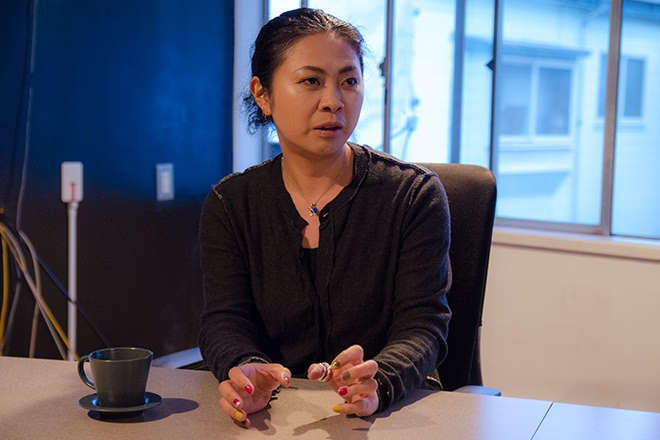
例えば、カメラマンさんが現場で「この撮り方はおかしい」と思えば、ディレクターに対して「ここで撮った画が死んでしまう」と怒るし、編集さんは編集さんで「僕が編集したとクレジットが出るのであれば、それはしたくない」と線を引いてくれる。デジタルになって、簡単に処理ができることで、そこは少しなあなあになってきているのかなと思います。
畠中
今はテープがいくらと意識すること、ほとんどないですもんね。
及川さん
当時もフィルムではないので、フィルム時代ほどの厳密さはないけど、それぞれの技量が肝というのは変わりなかったと思います。品質を担保してくれる優秀なカメラマンなど、技術者をディレクター同士でとりあったり。プロのスキルを集結して作っているという意識が、より強かったように思います。TV時代の14年間はアナログからデジタルの変革期で、徐々に視聴者のニーズも変化しました。私のやっていた番組で言うと、後半はテレビ版の「ぴあ」みたいにするというか、60分の中に15秒、1分、2分、25分といった細かな枠を積み重ね、パーッと多くの情報を散りばめて飽きないように観てもらう工夫をして1本の番組にしていくようになったんですね。
ニーズはデジタルスピードなのに、作業はほぼアナログ。その間で現場も早く動くことを求められるようになりました。
例えば、1日に2本取材して、まだアナログ編集全盛なので帰ったら編集室にこもる。家に帰れるのはタクシーで3時、4時。そのままタクシーに待ってもらって、お風呂にだけ入って局に帰るとか。そんな日常で、NHK時代の後半はどんどん細胞が老化した気がします。
畠中
取材して、編集して、締め切りはいつなんですか?
及川さん
その日ですよ。
畠中
マジっすか!
及川さん
1分未満の枠はその速度で。長尺の枠はある程度ジックリ取材しないと成立しないから並行させつつ。だから1日1人平均3本なのに、コーナーをいくつか抱えると地獄…。
「やらないと放送に穴開ける」と必死でやっていましたね。
畠中
だから、今も仕事のテンポが早いんですね。
及川さん
確かに。それは染み付いたものかも?ただ、1つ1つの仕事を瞬発力でこなすようにはしたくないので、なるべく早く、でも深く。「早く深く」を心がけています。
個人的にはドキュメンタリーが好きなので、金魚のフンみたいにその人についていって、時間をかけて理解してってことをやってみたいけど、過去のサイクルの慣れが染み付きすぎてたぶん、できないと思います。
アナログからデジタルへ。制作現場も視聴環境も変わった今
見る人を惹きつけるため、冒頭の5秒、10秒に加えるべき工夫とは?
畠中
デジタル化されることで、1本の作品を作るために必要な時間は減ったのかなと思います。その分の空いた時間はどんなふうに使っていますか?
及川さん
何かを見る時間にしているのかな。ディレクターは引き出しが多くないと対応できないと思っているので、ネタが枯渇しないようになるべく多くのものを見るようにしています。
映画でも、アートでも、ダンスでも、ゲームでもいいし、なんでも。現場の話題としてそれが出てきたとき、「わかる、わかる」と言える状態を増やす準備ですね。
ただ、「もう何も考えたくねぇ。ダメだ、脳みそが」と思ったら、スパッと切り上げて、ネコと遊んでいます。
畠中
見る側がテレビではなく、スマホやタブレットで鑑賞するようになってきて、映像作りの文法は変わりましたか?
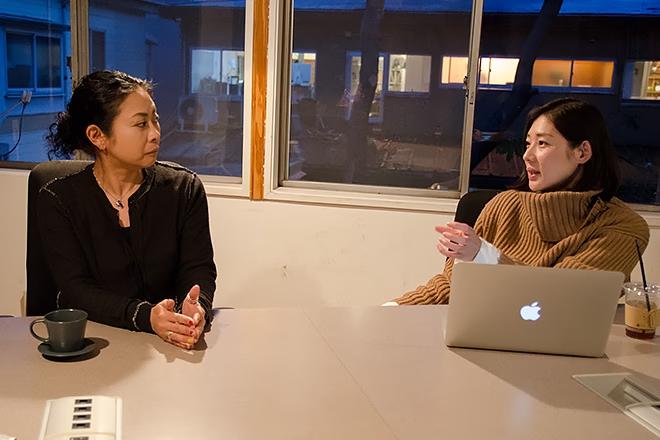
及川さん
冒頭は音声を出さずに見るとか、他のことをしながらながら見をするとかって機会が増えたと思うんですね。テレビだったら、それなりに集中して見てくれていたと思うんですけど、ネットの普及によって見る側の堪え性がなくなっている気がします。
ネットサーフィンと同じ感覚で、5秒、10秒眺めて興味がわかないと次に移っていってしまう。だから、どう飽きさせないようにカットをつなぐか、音を聞かない場合にもどう興味を持ってもらって、音を出すまでに至ってもらうか、請け負う案件で作りは変わりますが、方法論は必要かと。試行錯誤の段階ですけど。
畠中
映像をディレクションする上で、すごく気になります。当然、作るもの、狙っていくターゲットによって違うと思うんですが、頭の5秒、10秒に何を入れるべきなんでしょう? 今、夕歌さんと一緒にやっているインタビューの場合、「冒頭にこれを持ってくればいいんじゃないか」って、どうやって決めているんですか?
及川さん
友香さん(畠中のこと)と作っている映像は、おそらくすでに伝えたいサービスの内容に興味のある人が見る動画ですよね。だとすると、音を消した状態で見始めることはないと思うんです。
そうなると取っ掛かりとなるは、そのサービスに関するフックとなる映像や情報を入れるべきかなと思っています。
「このサービスはなんでいいのか?」「こうだからです」と。冒頭で伝わる作り。そのサービスを利用している会社が業界で有名な企業であれば、それが伝わる映像を。逆に紹介するのが小さい会社なら、どういうおもしろい使い方をしているのか。そんな切り口で考えています。
畠中
なるほど。
及川さん
私の中で、友香さんと一緒に制作している動画は一種のパズルみたいな感覚です。オーダーに対して、「私はこの形がいい」と思った素材を撮り、編集し、ピースがぱちっとハマったときの快感。「ほらキター」って。だから、楽しくやれていますよ。
インタビュー相手に合わせて、最適な聞き手に変わっていく
「勘と経験」によって培われた対人チューニング術
畠中
撮影中のことでとにかく印象に残っているのは、インタビューしてもらうとき、いろんな夕歌さんが現れることなんですよね。
及川さん
いろんな私?
畠中
夕歌A、夕歌B、夕歌Cが現れる、みたいな。
私は撮影の前にお客さんと何回か打ち合わせで会っているけど、夕歌さんは初対面のことも多いじゃないですか。だけど、ピタッと合う雰囲気の夕歌さんになって、スムーズにインタビューしているのが本当に不思議で。どういう感じで、「この人にはこういう感じでいこう」とチューニングしているんですか?
及川さん
うまく言えないけど、「勘+場数」かな。あとは、インタビュー相手の細かいところを観察しています。挨拶の仕方、名刺の出し方、飲み物の飲み方……。初対面からわずかな時間でもとりあえず観察していく。すると、「こういう人かも」とイメージが湧いてきません?
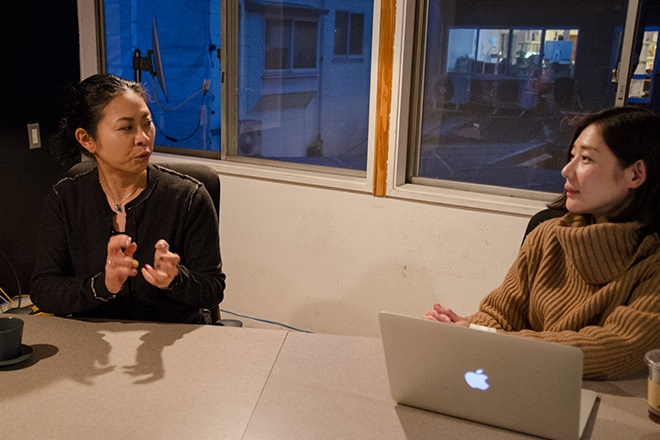
畠中
うーん。その域にはまだまだです。私なりに場をあたためて、「よろしくお願いします」とバトンタッチしたときには、相手に合わせてチューニング済みの夕歌さんがいるという……。
及川さん
そうなっているならよかった。
やっぱり取材は相手をギュッと濃縮し、さらに編集も加えていくわけで。現場でその人のコアな部分を撮っていきたい。
カメラの前では気分が良い状態でいてもらった方が絶対にいいし、せっかく映像が残るならいい顔をしてもらいたい。相手が「喋ってもいいかな」と感じてプラスαの何かが出てきたら、こっちとしては「やったぜ!」ってなるかな。
畠中
その感覚って、人と接する以上、どんな仕事でも大事ですね。
及川さん
現場があたたまれば、相手の人も「これくらいじゃないかな」と自分で考えているもの以上の魅力を出してくれるんですよ。
そうなると、まず作っている私たちがうれしいですし、見てくれる方々もうれしい。そして、いい映像が残れば出てくださった人もうれしいと思ってくれるはず。全方向がうれしさで満たされるための労力は惜しまない方がいいかなって思っています。
でも、観察に関しては無意識にやっているところもあるのかもしれない。撮影じゃないときも、「この人はなんで、こういう動きをしているのかな?」って考えているから。見るのが、好きなんだと思います。
フリーランスのビデオディレクターとして求めたもの
これまでとこれからのキャリアプラン
畠中
働き方について夕歌さんがどう考えているのかもぜひ聞きたいなと思っていて、フリーランスになって変わったことはありますか? 組織から離れて働くというのは人生の中で大きな選択だと思うんですが……。
及川さん
一番は自由が欲しかったんですよね。でも、フリーになってみると、自由な状態でい続けることが、一番不自由なんだなと思うこともあります。それは経済的な面で、生きていくためにある程度、コンスタントに稼がなくちゃいけないと迫られるから。それは会社に所属していたときよりも、色濃くなっているかもしれない。
それでもNHKを辞めたのは、十何年やった中で、決まった枠に向けて当てはめる仕事を一生懸命やってきて、感覚をたよりにできるようになったんだよね。ただ、毎日がルーティンみたいになってきて、退屈に感じるようにもなった。だから、1回リセットしてみよう、と。
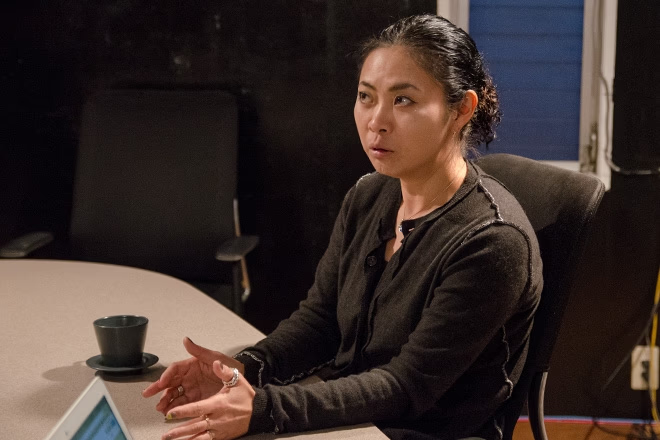
畠中
リセット?
及川さん
そう。「そもそも私は映像を作ることが好きなのかな? どうかな?」ってところから。この先も映像制作を続けて、これで食べていくのなら、好きかどうかをちゃんと理解した方がいいなと思ったんですよね。
それで、会社を1回離れてみよう、と。幸いフリーになってみたら、「やっぱり映像を作るのは楽しい」と感じたし、天職とまでは言わないけど、「まだまだできることがあるかもしれないな」って思えました。
あと、「会社を作らないの?」とも聞かれるんだけど、ちょっと面倒くさいのが本音で。会社の運営をやりつつ、物を作るほど器用ではないから、作ることに時間を割いていきたいなって。1つ1つの現場がオーディションみたいなものだから。
畠中
オーディションですか?
及川さん
1本でも下手なものを作ると、後はないと思っているので。いつも真摯に1つの仕事と向き合って、きちんと物を作っていく。なあなあに作らないことはもちろん、ケース・バイ・ケース、各現場に合わせて自分が繰り出すことのできる方法論の中から最適だと思えるものをいかに主張していくか。それがフリーランスとして仕事をしていく上で、重要なことだと思っています。
畠中
今後に向けてはどんなイメージを描いていますか?
及川さん
人生設計?そんな先まで見ていないかも……。
この仕事は体力勝負という面もあるけど、できるところまではやりたいなと思っています。そして、死ぬまでとは言わないですけど、ずっと物は作っていきたいです。映像じゃなくなるかもしれないですけど、何かは作りたい。残したい。うん、私は残すより「伝える」方が好きなのかな。
畠中
伝えるって、映像ではドキュメンタリーとか?
及川
それは縁かも。対象に惚れないと撮れないので。ある日、急に「友香さんのことが撮りたい!」と言い出して、ストックしていくかもしれない。実際、ダンスカンパニーの Nibrollさんとかとは NHK時代からお付き合いがあって、ちょっとずつ撮り貯めていたこともあるんですけど。
ダンスってその都度、ステージ上ならパッと消えてしまうから。それを映像で伝えるのはいいなぁと思うんです。
畠中
単純な興味なんですけど、夕歌さんもダンスをやっていたんですか?
及川さん
やっていません。
畠中
Nibrollさんもそうですし、そういったつながりはどうやって作ってきたんですか?
及川さん
NHKのディレクターのとき、番組のアートコーナーのチーフをやっていたんですよね。私の目利きで何でも誰でも出せるっていう枠で。
「絶対、これは知られてなくね?」ってものばかり出していたんですよ。当然、プロデューサーにはよく怒られましたけど(笑)。
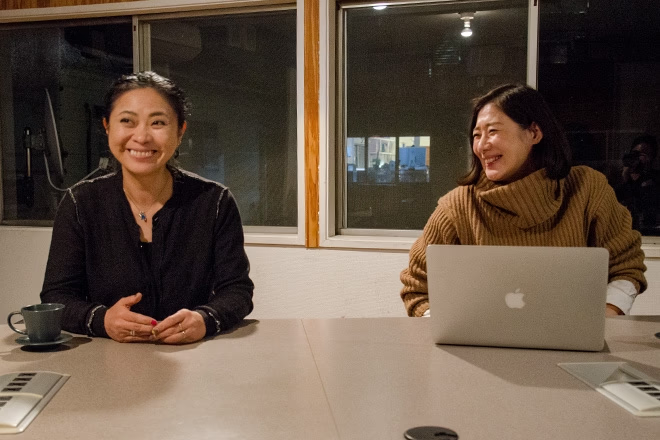
ただ、Nibrollもそうなんだけど、10年、15年とやっている人たちは世の中でそれなりの位置に来るし、コンセプトを持ってやっている人たちって大成してくるんですよね。
だから、私の目利きも間違っていなかったなって。そう思うと、昔から「なきゃ、なくてもいいけど、あったらちょっといいよね」ってことを残していくのが好きなんだろうな。なんだろう、この気質。私は、クリエイターではないんだろうなと思います。
畠中
クリエイターではないというのは?
及川さん
仕事が1つのお弁当箱だとすると、私はご飯で、撮影を通じて友香さんと一緒に素材を集めて、幕の内弁当を作っている感じです。
鶏肉があって、おしんこがあって、それぞれの素材も良くないといけないし、調理の仕方が良ければなおさらおいしくなるし。おいしいおかずがいっぱいあるから、あとはどううまくまとめるか。私は無味無臭で側にいるようなイメージです。
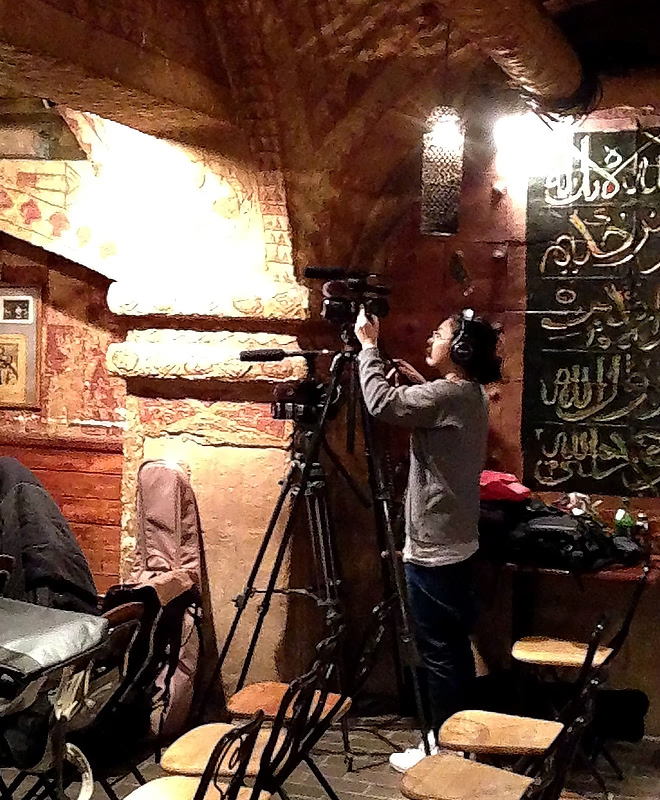
撮影する及川さん(写真提供:art cocoon)
私的には、発信しないのがポリシー。自分から何も発信しようとは思わない。楚々として、そこにある何かを残していきたい。もちろん、現場では「こう撮りたい」「この方がいい」と主張しますけど。
畠中
お休みの日はどんな過ごし方なんですか?
及川さん
なんだろう……旅もそんなにしないしなぁ。何に興味があるんだろう、私……。仕事かな。仕事が趣味みたいなものですね。ほぼずっと考えてますもん。
「あれ、聞くの忘れた!」ってたまに夢みますよ。これ、やばいのかしら。でも、考えて続けるのは楽しいですよ。この間、撮ってきた素材をどういうふうに編集したら良くなるかなって。イチから新しいものを作るわけじゃないので、何か工夫しなくちゃいけないじゃないですか。その工夫をどういうふうにするのが一番いいのか。それを考えるのはつらいけど、おもしろいですね。
情熱の幕の内弁当。うん。そうやって生きています、私は。
それで、死ぬ前に何か撮りたいものがある? と聞かれたら、特撮かな。
畠中
特撮ですか?
及川さん
みんなが集まって「俺はこれができるよ」「私はこれが得意」ってやっていく作業が好きなんですね。思考の集まりの化学変化が好きです。だから デジタルよりは、アナログにコチョコチョやってるのが好き。こういうふうに見えるようにって手を動かしていく手順が好き。CGとか、もういいって感じで。
機械任せでチューニングできることと、人的にチューニングだからできることがあって。私は後者の方に愛着があるんですよね。ダンスが好きなのもそういうことなのかもしれない。アートに惹かれるのも同じ。どっか歪んでいるとか、この人は恐ろしく足が上がるとか、人的なすごさを見るのが好き。だから、もっと歳をとったら、あえて撮影に最も手間がかかるアナログ特撮を作ってみたいですね。
及川さんへのおたより
ゆうかさんとは、私が常駐している企業で制作をしている映像のお仕事でご一緒させて頂いています。
はじめて一緒に映像を作ることになってから、まだ半年ほどしか時間が経っていないのですが、過ごしている時間の濃度が濃いのか、振り返って半年しか経っていないことに自分自身驚きが隠せません。
ゆうかさんとの現場ややり取りは、これまで映像未経験できた私にとって学びたいことがゴロゴロ転がっている本当に有り難い場。外部の講座などに出ることも、学べる良い時間ですが、こうして仕事の現場で生の声や動きを見聞きして肌で体験しながら吸収できるのは、ゆうかさんのように仕事の現場でも支えてくださる方がいるからこそできること。
これからも余すことなく、ジャンジャンゆうかさんスキルを盗んでいきたいと思います(笑)今回のインタビューで、今のゆうかさんの仕事スタイルのあり方が積み重ねてきた歴史の重さだと痛感し、そんな方とこれからも長く深くお仕事をご一緒していけたら幸せだなーと改めて思ったのでした。
これからも、よろしくお願いします!
畠中 友香
